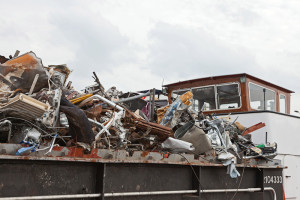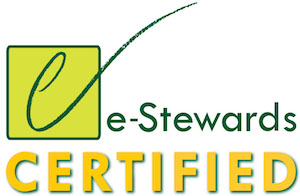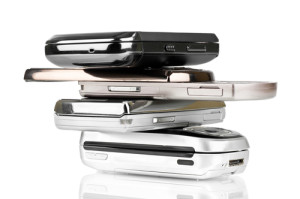
Editor’s note: according to a more recent report (2010), about 1.8 million tons of e-waste ended up trashed in 2010 with 27 percent recycled. But other recycle rates found on various e-waste recycling websites range from 12.5 to 20 percent. Either way, e-waste is an enormous issue and is growing two to three times the rate of any other source of waste.
Please keep your computers, cell phones and other used electronics out of landfills.
Our increased reliance on personal technology—laptops, cell phones, PDAs, computer monitors, printers—has resulted in vast quantities of garbage in landfills and incinerators that could have been reused or recycled.
About 2.6 million tons of e-waste ended up in landfills in 2007, according to the U.S. Environmental Protection Agency, while only 13.6 percent (408,000 tons) was recycled.
If Americans recycled the more than 100 million cell phones that are no longer used, the amount of energy saved would be enough to power approximately 24,000 U.S. households for one year.
Some of the materials in personal electronics, such as lead, mercury and cadmium, are hazardous and can release dangerous toxins into our air and water when burned or deposited in landfills improperly. And throwing away metal components, like the copper, gold, silver and palladium in cell phones and other electronics, leads to needless mining for new metals.
Fortunately, there’s a solution: returning your used electronics for responsible recycling, rather than throwing them in the trash.
Know where it goes
The key to responsible e-waste recycling is knowing where your stuff will end up. Watch out for any recycler who ships discarded electronics to developing countries for processing. Avoiding sending our garbage overseas saves on greenhouse gas emissions and helps protect workers and the environment in developing countries.
As reported in a 2006 OnEarth magazine article, upwards of 80 percent of the world’s e-waste is transported to Asia, and most of it winds up in China. Workers who disassemble consumer electronics by hand are exposed to toxic substances, which also contaminate groundwater.
There are many ways to recycle, but only one works
For most of us, it’s been very confusing to figure out what to do with used electronics. Charitable programs, resellers, retailer and manufacturer take-back programs, and even free collection events have all popped up in the past decade in response to the well-publicized problems with recycling used electronics.
But no matter which you choose, it has been impossible to tell what really happens to your e-waste. Every take-back program, charitable program, or collection event has to use an electronics recycling company at some point. A charity or take-back program is not a responsible way to dispose of e-waste if it is only another path to an unscrupulous recycler.
While all recyclers say they only use responsible methods, there’s been no way for them to prove it until recently.
Look for E-Stewards Certification
 Now, the best electronics recyclers are becoming fully certified to the highest environmental and social standard. By choosing an e-Stewards Recycler, individuals and businesses are choosing the most trustworthy recyclers, ones that have been independently verified to handle e-waste in the most globally responsible way– using safe technologies and careful protections for workers.
Now, the best electronics recyclers are becoming fully certified to the highest environmental and social standard. By choosing an e-Stewards Recycler, individuals and businesses are choosing the most trustworthy recyclers, ones that have been independently verified to handle e-waste in the most globally responsible way– using safe technologies and careful protections for workers.
e-Stewards Certification is the only marketplace solution supported by the environmental community and responsible electronics recycling companies. It was created to be both principled and practical, and it joins other best-practice certification programs such those by the Marine Stewardship Council and Forest Stewardship Council, as the most protective standard and the most rigorous program for verifying recyclers are doing things right.
No matter where you take your e-waste—to collection events, recyclers, or take-back programs—you should be sure that 100 percent of the electronic equipment will go only to e-Stewards Recyclers. It’s the best way to protect the global ecosystem and human health when it comes to electronics recycling.
Check with the e-Stewards Recyclers in your area about recycling your e-waste. For a list of e-Stewards Recyclers and more about e-Stewards Certification, see e-stewards.org.
Donate or Sell
Giving away or selling used electronics are great ways to extend their use and keep them out of landfills. Some services provide second-hand computers to schools or nonprofits, so your functional old computer could become a valuable tool for someone in need. Please assure that whomever you donate your used electronics to will use an e-Stewards certified recycler at the electronics’ end of life.
Take Action
 NRDC, along with the Electronics Take Back Coalition, is working to establish producer responsibility e-waste recycling laws in states around the country. Right now, 19 states (Connecticut, Hawaii, Illinois, Indiana, Maine, Maryland, Michigan, Minnesota, Missouri, New Jersey, Oklahoma, Oregon, North Carolina, Rhode Island, Texas, Washington, Virginia and West Virginia, Wisconsin) have such laws in place, which mandate that manufacturers take back their discarded electronics for recycling.
NRDC, along with the Electronics Take Back Coalition, is working to establish producer responsibility e-waste recycling laws in states around the country. Right now, 19 states (Connecticut, Hawaii, Illinois, Indiana, Maine, Maryland, Michigan, Minnesota, Missouri, New Jersey, Oklahoma, Oregon, North Carolina, Rhode Island, Texas, Washington, Virginia and West Virginia, Wisconsin) have such laws in place, which mandate that manufacturers take back their discarded electronics for recycling.
California also has a mandatory e-waste recycling law, based on a different approach. Numerous other states are also moving towards enacting e-waste laws. In 2008, New York City passed the nation’s first comprehensive municipal electronics recycling law. Federal e-waste legislation is likely some years away.
NRDC backs e-waste laws that require manufacturers to assume responsibility for taking back and recycling their used products. Such laws—which have been adopted by almost all states that have passed e-waste legislation to date—encourage the design of less toxic, more easily recyclable gadgets. NRDC also supports strict manufacturer reporting requirements and other measures to limit the export of e-waste abroad.
Tell the retailers to help us recycle electronics by clicking here. ~ Ed.
Bonus:
Check out another way with this Green Divas Eco Style podcast about how to recycle… with your wardrobe!
Images via shutterstock.com
[dynamic-sidebar id=’Custom Widget 2′]
Office and Telecom Equipment Recycling
October 6, 2016 at 6:59 am
I like the way you share the whole article with us in such a wonderful manner. I really like it.